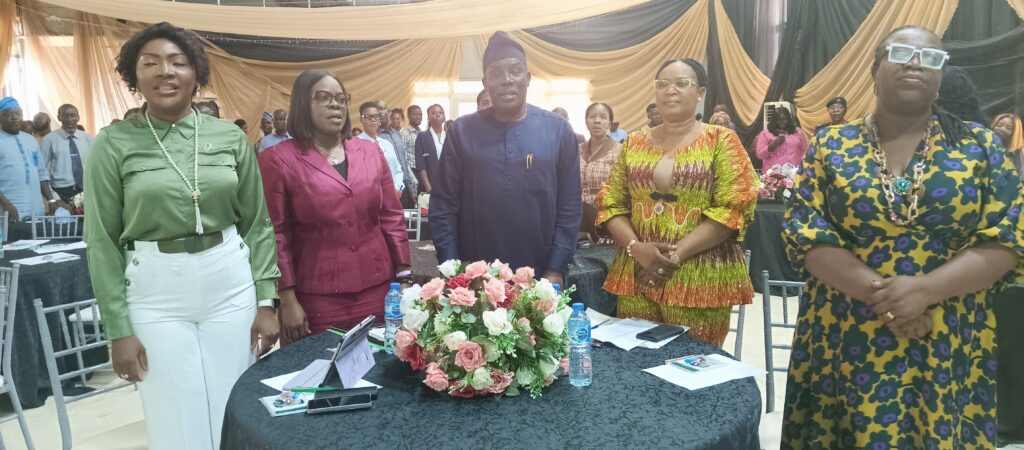Daud Olatunji
The Ogun State Government, in collaboration with the State House of Assembly and civil society actors, has reaffirmed its commitment to ending gender-based violence (GBV) and ensuring equity and inclusion through far-reaching legislative reforms.
Speaking during a high-level Parliamentary Dialogue on Monday, June 23, 2025, the Commissioner for Women Affairs and Social Development, Hon. Motunrayo Adijat Adeleye, described the event as a “strategic battleground against injustice, ignorance, and indifference.”
The dialogue, held at Mitros Residence in Abeokuta and facilitated under the World Bank-supported Ogun State Economic Transformation Project (OGSTEP), focused on three critical legislative instruments—the Diversity, Equity and Inclusivity (DEI) Commission Bill, the Gender Mainstreaming Framework, and the FRILIA Bill on land rights.
According to Adeleye, “Gender-based violence, child abuse, and discrimination against persons with disabilities are not just social issues—they’re public health crises and economic threats. When a child is molested or a woman silenced, an entire generation loses its voice. This dialogue is our opportunity to transform intentions into tangible protection.”
The DEI Commission Bill, comprising 45 sections, seeks to institutionalize fairness and equal opportunity, prohibit discrimination, and ensure the inclusion of marginalized groups in policymaking. “These bills are not just policy documents. They are legislative weapons designed to protect lives, restore dignity, and ensure inclusive governance,” Adeleye said.
She commended the State Assembly for conducting the first reading of the DEI Bill, applauding Speaker Rt. Hon. Daisi Elemide and key legislators for their responsiveness. “A law unenforced is just a well-written wish. Let us match intentions with action,” she urged.
Also speaking, Speaker Elemide underscored the inclusive intent behind the proposed laws. “When we talk about GBV, it is not just about women. Men also suffer in silence. This bill promotes equal opportunities for all sexes—no one should be ridiculed or relegated,” he said. He further assured that the House will ensure implementation through its Legislative Compliance Committee.
“We make laws, but it is the people who must use them. If your rights are being violated, make use of the law,” Elemide stated.
Executive Director of the Women Advocates Research and Documentation Centre (WARDC), Dr. Abiola Akiode-Afolabi, praised the Ogun government’s efforts, noting the timeliness of the dialogue. “With rising GBV cases, we need holistic legal frameworks. These bills can bridge the gap between policy and justice,” she said.
Dr. Akiode-Afolabi emphasized the importance of inclusive governance and data-driven policy. “We can’t develop without everyone at the table—women, people with disabilities, the elderly. And that means investing in documentation, technology, and capacity building,” she added.
The dialogue brought together lawmakers, civil society organisations, gender rights activists, development partners, traditional leaders, and youth groups, who reviewed the draft DEI and FRILIA bills and proposed strategic inputs.
The FRILIA Bill (Framework for Responsible and Inclusive Land-Intensive Agriculture), in particular, seeks to protect community land rights while ensuring gender and youth participation in agricultural investments.
In the resolution after the event, the stakeholders resolved that there must be a legislative prioritisation of the DEI and FRILIA Bills,creation of a legislative review committee to harmonize stakeholder feedbackand institutional capacity building on anti-discrimination and gender inclusion.
Also , as parts of the resolutions were to have a dedicated budgetary allocations for gender equity programmes.and that sustaining the ongoing engagement with civil society and development actors.
It was also resolved that a final technical session will precede the plenary presentation of the reviewed bills, with the House Committee on Women Affairs, Social Development, and Poverty Alleviation leading the legislative process.
In her closing remarks, Adeleye pledged that her Ministry would remain the bridge “between policy and people, pain and healing,” while urging all stakeholders to fix “the leaking roof” of systemic failure.
“This is not just another policy talk—it’s a turning point,” she declared.
The dialogue ended with a communique signed by representatives of the House of Assembly, OGSTEP, WARDC, and key ministries, affirming Ogun State’s resolve to promote dignity, equality, and inclusive governance for all residents.
Do you want to share a story with us? Do you want to advertise with us? Do you need publicity for a product, service, or event? Contact us on WhatsApp +2348183319097 Email: platformtimes@gmail.com
We are committed to impactful investigative journalism for human interest and social justice. Your donation will help us tell more stories. Kindly donate any amount HERE




